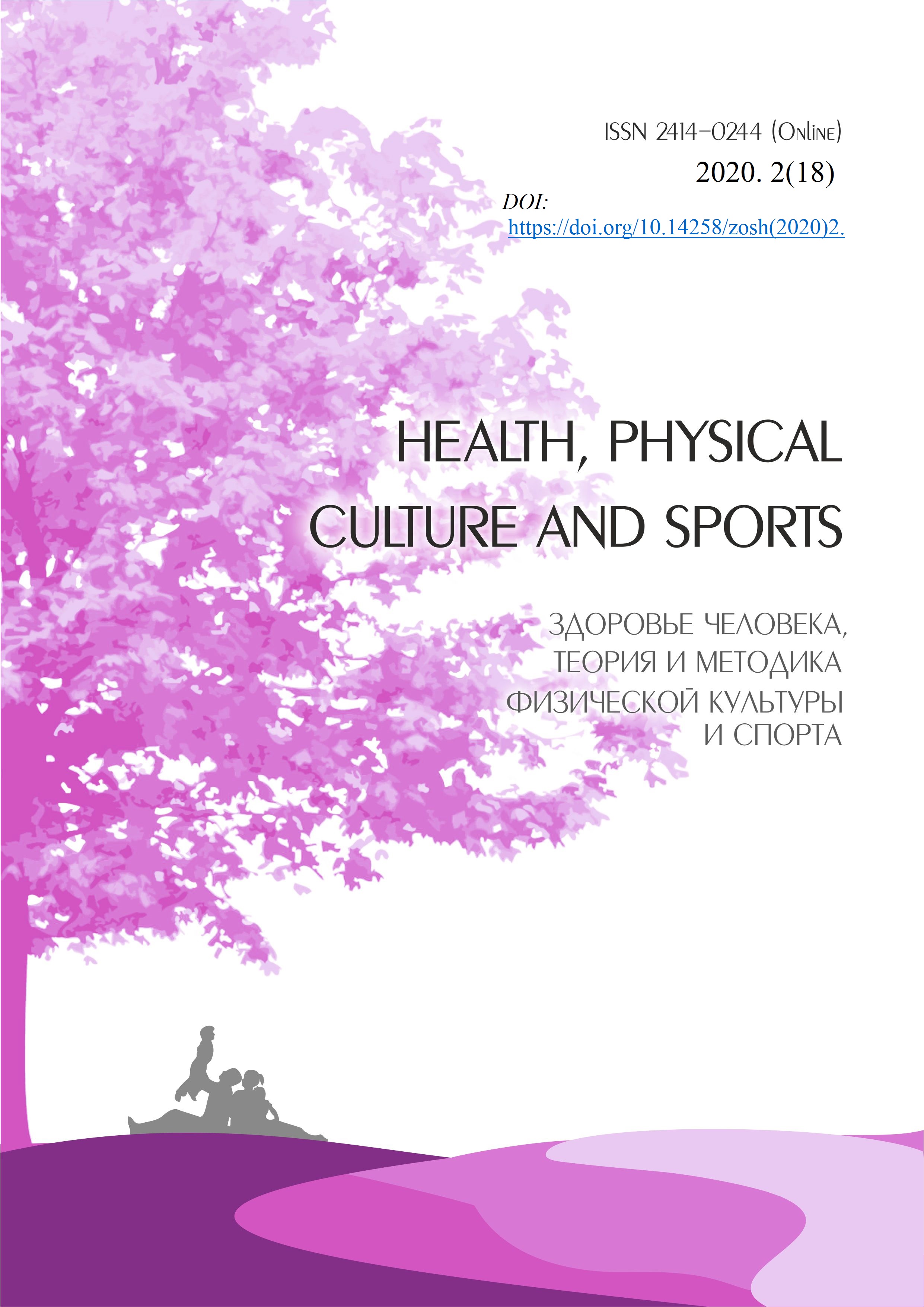Formation of health culture in the process of sports training of Greco-Roman style wrestlers
Abstract
Abstract.
Objective: to clarify pedagogical tools and methods that can be used in the process of sports training of Greco-Roman style wrestlers for the purposeful formation of their health culture.
Material and research methods. The work was carried out in 2019 on the basis of children's sports schools in Tiraspol and Rybnitsa (Transnistria). Methods such as observation, survey, modeling, pedagogical experiment were used. An analysis of the diagnosis of the initial level of health culture among schoolchildren involved in the struggle at the training stage (60 people) showed that athletes are motivated, above all, to achieve sports results, value-semantic priorities in relation to health and health conservation are not defined, not formed in full knowledge of health, a healthy lifestyle. To create a culture of health in the process of sports training, an educational and developing environment was created that promotes the formation of motives for caring for one’s health, understanding the value and importance of health for the growth of sportsmanship, the development of the need for self-knowledge, introspection and self-improvement; mastering knowledge and ways of health conservation.
The results of the study. The implementation of the Greco-Roman style wrestlers in the process of sports training, the developed models and methods of forming a health culture, contributed to the acquisition by subjects of knowledge, skills in health preservation and conducting healthy life activities.
Findings. Health culture is a necessary personal education of an athlete. For the formation of a health culture in the process of sports training, the interaction of all interested parties is necessary, aimed at educating athletes of a conscious value-based attitude to health, motivation, knowledge and skills for the implementation of healthy life.
Downloads
References
References
Abramova V. V., Linevich B. B. (2019). Formation of health culture in the process of sports training as a pedagogical problem, 2019, № 8, Р. 42-46. Akhverdova O. A., Magin V. A. (2002). To study the phenomenon of "health culture" in the field of professional physical education. Theory and practice of physical culture. №. 9, p. 5-7. Vodolazhsky V. A. (2016) Essence and specificity of formation of culture of health of children and teenagers Gavrileva K. S., Zakharova A. A., Khandy M. V. (2012). Features of the state of health of young athletes of the school of the Olympic reserve of the Republic of Sakha (Yakutia) Problems of development of physical culture and sport in the new Millennium: materials of the international scientific and practical conference. FSAU VPO "Russian state professional pedagogical University". 2012. Pp. 76-79. Golikov N. (2002). Health culture of schoolchildren: the essence of the problem, the solution strategy. Physical Culture. Guryanov M. S. (2002) State of health and ways to improve medical care for pupils of children's and youth sports schools: abstract. Kazan. Р. 29 Zavyalov D. A. (2004). Application of health-saving technologies in the training process of high-class athletes. Physical culture and sport in the education system. Health-saving technologies: Collection of materials of the international Symposium. Krasnoyarsk, Pp. 181-183. Ivanov Yu. A., Soporbyanova A. K. (1984). Experimental substantiation of the need to correct the diet of a wrestler under intense physical exertion. Theory and practice of physical culture. №. 9, Рр. 13-14. Irkhin V. N. (2006). Experiment in the school of health (from the experience of health schools in the Belgorod region: method. stipend. Belgorod: publishing house of BSU. P. 112 Irkhin, V. N. (2010). health Schools of Belgorod region. Belgorod: CPI "Polyterra". Р. 188 Kuznetsov V. Yu., Olenkin Yu. V. (2011). Health culture in modern society. Topical issues of social Sciences: sociology, political science, philosophy, history: materials of the VII international correspondence scientific and practical conference. Novosibirsk: Siberian Association of consultants. Рp. 85-90. Marinich V. V., Khorunzhiy A. A., Guba V. P. (2015.). Monitoring of the functional state of young athletes in martial arts. Materials of the all-Russian scientific and practical conference dedicated to the 90th anniversary of the journal "Theory and practice of physical culture". Moscow: Russian state University of physical culture, sport, youth and tourism. Рp. 436-439. Osipov A. Yu. (2011). Problems of health saving in sports. Modern physical culture and health technologies in physical education: Collection of materials of the all-Russian scientific and practical conference. Tchaikovsky: Tchaikovsky GIFK. 205 p. Pavlenkovich S. S. (2017). Interrelation of various types of education in the process of forming the culture of health of students of physical education institutions. Аsou Conference: collection of scientific papers and materials of scientific and practical conferences. Moscow: Academy of social management. No. 1, 2017. Pp. 1307-1310. Pankov V. A. (2002).Increase of efficiency of preparation of fighters with complex educational technologies: a summary. Moscow: Adygeya state University, P. 53 Razumov A. N., Ponomarenko V. A., Piskunov V. A. (1996). Health of a healthy person // Fundamentals of restorative medicine. Moscow: Meditsina, 413 p. Chernukhina O. V. (2009). Selection that preserves children in sports (for example, women's gymnastics).
Copyright (c) 2020 Health, physical culture and sports

This work is licensed under a Creative Commons Attribution-NonCommercial 4.0 International License.
An author should not normally publish manuscripts describing essentially the same research in multiple journals or publication venues. Such redundant publication is generally considered to constitute unethical publishing behavior, and if discovered may result in a manuscript under consideration being rejected, or a published article being retracted.
Authors of manuscripts reporting on original research should present an accurate account of the work performed, accompanied by an objective discussion of its significance. Underlying data should be represented accurately in the manuscript. The manuscript should contain sufficient detail and references to permit others to replicate the work. The fabrication of results and the making of fraudulent or knowingly inaccurate statements constitute unethical behavior and may be cause for rejection or retraction of a manuscript or published article.





